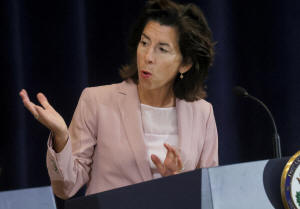|
Commerce Secretary Gina Raimondo told reporters the program
aimed to diversify the United States away from its traditional
tech hubs like Silicon Valley, Seattle and Boston.
"Those tech ecosystems are concentrated in just a few places
around the country," Raimondo said. "They don't reflect the full
potential of our country.... They don't corner the market on
great ideas."
The program is part of President Joe Biden's belief the
government should help fund key sectors to attract more private
sector investments in industries like electric vehicle battery
production, semiconductors and clean energy.
White House National Economic Director Lael Brainard said the
regional tech program makes "smart public investments in
critical technologies in every region of the country."
The Biden administration this month announced seven "hydrogen
hubs" in 16 states would share $7 billion to jump-start the
emerging industry.
The designated regional tech hubs are in places like Montana,
Wisconsin, upstate New York, Vermont, Nevada, Illinois and
Puerto Rico, and are focused on areas including semiconductors,
clean energy, critical minerals, biotechnology, artificial
intelligence and quantum computing.
"People shouldn't have to move to get a good job," Raimondo
said, noting many of the hubs are in small cities.
A Washington state and Idaho hub will focus on developing new
materials for more fuel-efficient next-generation aircraft,
while an Oklahoma hub seeks to commercialize autonomous systems
in areas like agriculture and pipeline inspections. A Wisconsin
program aims to develop personalized medicine.
The hub designations are no guarantee of federal funding.
Raimondo said the administration next year plans to award about
five to 10 of the 31 tech hubs up to $75 million each.
Congress approved $500 million for the program in August 2022 as
part of the landmark "Chips and Science" law that provides $52
billion for U.S. semiconductor production and research to better
compete with China.
Biden this year asked Congress for $4 billion to fund additional
regional tech hubs. Congress has not yet approved a full-year
budget for the current fiscal year.
(Reporting by David Shepardson; Editing by Jamie Freed)
[© 2023 Thomson Reuters. All rights
reserved.] Copyright 2022 Reuters. All rights reserved. This material may not be published,
broadcast, rewritten or redistributed.
Thompson Reuters is solely responsible for this content.

|
|




